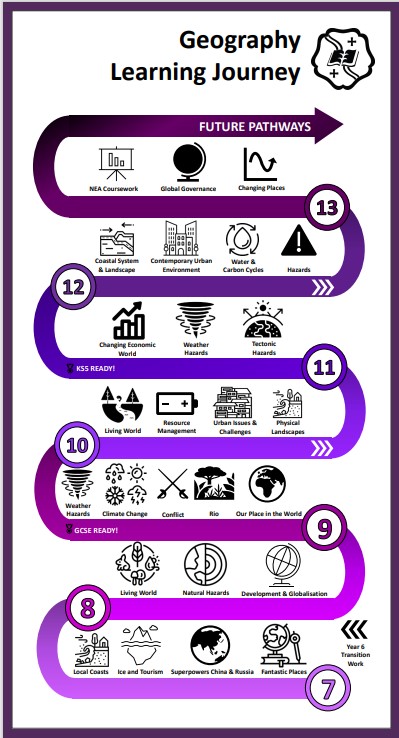Geographers have potential to be well-informed
global citizens, using their unique combinations of knowledge and skills to make
a positive difference in the world. Geography helps us all to be more socially
and environmentally sensitive, better informed, and more responsible as
citizens and employees.’ (Royal Geographical Society).
Students will begin their Geography curriculum by looking at the basics of Geography to get a firm understanding about what we will look at during Y7, 8 and 9. They will find out how human and physical interactions cause changes to our planet, but also how we can solve some of these problems. This involves deep discussions about the challenges our world faces and what we can do as individuals to protect our world, and they will learn how to justify their opinions giving the extent to which they agree/disagree with different ideas. This leads on to topics that we study at GCSE, getting students GCSE ready. The course also involve a variety of fieldtrips to see Geography in the flesh; students will undertake both human and physical fieldwork.

Geography is the study of the Earth’s landscapes, people, places and environment – it’s about the world we live in. An understanding and enthusiasm for Geography, and the development of geographical knowledge, is essential for the 21st century in a world where population growth, rapid development, global environmental change, social and economic inequality, and resource depletion threaten the very planet on which we live. These problems place increasing burdens on cultural tolerance, the sustainable management of societies, natural resources including bio-diversity, and landscapes. Geographers have a key role to play in understanding and helping to solve these issues.
“Geography is a subject which holds the key to our future”
Michael Palin
Exam Board: AQA
Qualification Title: Geography
Qualification Specification Code: 8035
Qualification Webpage: Click here to visit the AQA webpage for the specification.
Geography is one of the subjects with the highest rates of graduate employability. It is highly valued by employers for its combination of knowledge, integration, and competence at training in the key skills.
“Great things are done when men and mountains meet” William Blake (1757 – 1827)
You will need to have a general interest in current affairs, as all of the content links to news events or general events occurring around the world on a daily basis. Students will also need good maths skills, as part of the course involves using basic data manipulation.
Course combines well with:
Biology, Business Studies, Economics, Mathematics, Geology, Leisure and Recreation, Environmental Science, Computing/IT.

Written exam: 1 hour 15 minutes
• 76 marks (including 6 marks for SPaG)
• 30% of GCSE
• Pre-release resources booklet made available 12 weeks before Paper 3 exam.
Surveying, Planning, Housing and Property Management, Geographical Information Systems, Teaching, Water Companies, Cartography, Tourism, Military, Law, Journalism, Civil Service, Environmental Management and Consultancy, Resource Management, Accountancy.
A Level Geography
is designed to follow on from GCSE. The specification is divided into Human and
Physical Geography, identical to GCSE Geography. The topics we teach are
designed to reflect world issues in an everchanging world. The physical topics
are Coastal Systems and Landscapes, the Water and Carbon cycles and Hazards,
and the human topics are Contemporary Urban Environments, Global Systems and
Global Governance and Changing Places. Students also have to complete an
independent fieldwork investigation in which they must come up with their own
hypothesis, plan their fieldwork and methods, and implement their study. This
is to help students build on their independent skills in preparation for
University. The two year course involves all students undertaking fieldwork in
relation to processes in both Physical and Human Geography. The students will undertake
four days of fieldwork during their A-Level course, both local and further
afield, as well as our Iceland trip.
The Geography Department at Highcliffe School follows the AQA exam specification. This enables students to broaden their horizons by developing their knowledge of places, processes and sustainability. This is achieved through an in-depth understanding of fundamental processes in physical and human geography at a range of temporal and spatial scales.
Students will be able to recognise and analyse the complexity of human and physical interactions at all geographical scales and assess the role these play in contributing to key world issues.
Students will be given opportunities to develop key transferrable skills that can be used post education, for example, becoming confident and competent in selecting, using and evaluating a range of quantitative and qualitative skills and approaches. For example:
• Independent, confident and ambitious Geographers who are able to set their own research questions and collect data to support their own enquiries (NEA).
• Analysing key sources (quantitative and qualitative) of information for patterns, anomalies and trends (6 mark questions across all units)
• Superbly structured answers that offer evidenced based opinions and come to reasoned conclusion (9 and 20 mark questions across all units).
Exam Board: AQA
Qualification Title: Geography A Level
Qualification Specification Code: 7037
Qualification Webpage: Click here to visit the AQA webpage for the specification.
Standard Sixth Form entry requirements

Future Pathways: Geography/Geology
based degrees, Coastal Engineering Planning, Environmentalist, Town Planner,
Geographical Information System Officer, Meteorologist, Teacher, Cartographer,
Tourism Officer, Transport Planner, International Aid/Development worker. The
topics we teach will excite students’ minds, challenge perceptions and
stimulate their investigative and analytical skills.
Mr Houghton
Owned by: MDS | Last Published: 20/09/2019 09:53:36 | Next Update: N/A